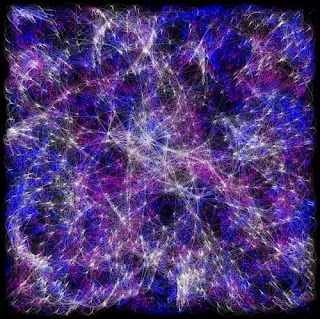The Non-Science of Physics?
Generally speaking, the term hard science applies to empirical sciences that are used to observe, test, measure, and repeat things. This also means something should be verifiable. Otherwise, a hypothesis has no practical value and could be pseudoscience.
Mathematics and physics get into the workings of the universe, whether the velocity of the coffee cup your cat pushed off the kitchen counter upon impacting the floor, to astronomy and such. Isaac Newton's Laws of Motion explain a great deal, then came Uncle Albert Einstein's Theory of General Relativity.
 |
| String Theory 2, Flickr / parameter_bond (Public Domain) |
Various theories have no beef. They may look good on paper — well, on monitors nowadays — and appear to have sound reasoning, but they cannot be tested. Some say we should still accept their scientific validity because they are "elegant", but others say that stuff is not science.
Interesting that origins science cannot be empirical, but we're to accept Darwinism, the Big Bang, and other things without sufficient evidence even though they may look good to secularists. They reject biblical creation science out of hand, even though our evidence and logic are sound. Two standards, no waiting. Indeed, Jesus is the one who hold everything together (Heb. 1:3, Col. 1:16), and this is the logical conclusion. Materialists hold to blind faith, old son.
Physics has hit its awkward teenage years. After establishing many fundamentals and enjoying several major growth spurts, physics has reached the age of lost confidence. It is now unsure of itself and its own “cold, hard facts.” Or, at least, leading physicists are feeling this way. In their scramble to reduce all of life to physical explanations and reasonings, they have run into something of an identity crisis.
. . .
In the effort to understand the underlying nature of reality, theoretical physics has run into challenges that are so abstract that the scientists are no longer able to provide concrete, testable predictions about the world. They describe conditions that we may never be able to replicate on this planet.
Although people with a background in such things will get the most out of the article, it is still useful to the rest of us. To read it all or listen to the audio version, navigate over to "Is This Science?"